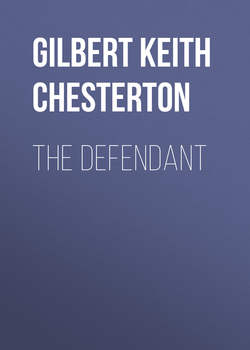The Defendant

Реклама. ООО «ЛитРес», ИНН: 7719571260.
Оглавление
Gilbert Keith Chesterton. The Defendant
IN DEFENCE OF A NEW EDITION
INTRODUCTION
A DEFENCE OF PENNY DREADFULS
A DEFENCE OF RASH VOWS
A DEFENCE OF SKELETONS
A DEFENCE OF PUBLICITY
A DEFENCE OF NONSENSE
A DEFENCE OF PLANETS
A DEFENCE OF CHINA SHEPHERDESSES
A DEFENCE OF USEFUL INFORMATION
A DEFENCE OF HERALDRY
A DEFENCE OF UGLY THINGS
A DEFENCE OF FARCE
A DEFENCE OF HUMILITY
A DEFENCE OF SLANG
A DEFENCE OF BABY-WORSHIP
A DEFENCE OF DETECTIVE STORIES
A DEFENCE OF PATRIOTISM
Отрывок из книги
In certain endless uplands, uplands like great flats gone dizzy, slopes that seem to contradict the idea that there is even such a thing as a level, and make us all realize that we live on a planet with a sloping roof, you will come from time to time upon whole valleys filled with loose rocks and boulders, so big as to be like mountains broken loose. The whole might be an experimental creation shattered and cast away. It is often difficult to believe that such cosmic refuse can have come together except by human means. The mildest and most cockney imagination conceives the place to be the scene of some war of giants. To me it is always associated with one idea, recurrent and at last instinctive. The scene was the scene of the stoning of some prehistoric prophet, a prophet as much more gigantic than after-prophets as the boulders are more gigantic than the pebbles. He spoke some words – words that seemed shameful and tremendous – and the world, in terror, buried him under a wilderness of stones. The place is the monument of an ancient fear.
Religion has had to provide that longest and strangest telescope – the telescope through which we could see the star upon which we dwelt. For the mind and eyes of the average man this world is as lost as Eden and as sunken as Atlantis. There runs a strange law through the length of human history – that men are continually tending to undervalue their environment, to undervalue their happiness, to undervalue themselves. The great sin of mankind, the sin typified by the fall of Adam, is the tendency, not towards pride, but towards this weird and horrible humility.
.....
It becomes increasingly apparent, therefore, that the world is in a permanent danger of being misjudged. That this is no fanciful or mystical idea may be tested by simple examples. The two absolutely basic words 'good' and 'bad,' descriptive of two primal and inexplicable sensations, are not, and never have been, used properly. Things that are bad are not called good by any people who experience them; but things that are good are called bad by the universal verdict of humanity.
Let me explain a little: Certain things are bad so far as they go, such as pain, and no one, not even a lunatic, calls a tooth-ache good in itself; but a knife which cuts clumsily and with difficulty is called a bad knife, which it certainly is not. It is only not so good as other knives to which men have grown accustomed. A knife is never bad except on such rare occasions as that in which it is neatly and scientifically planted in the middle of one's back. The coarsest and bluntest knife which ever broke a pencil into pieces instead of sharpening it is a good thing in so far as it is a knife. It would have appeared a miracle in the Stone Age. What we call a bad knife is a good knife not good enough for us; what we call a bad hat is a good hat not good enough for us; what we call bad cookery is good cookery not good enough for us; what we call a bad civilization is a good civilization not good enough for us. We choose to call the great mass of the history of mankind bad, not because it is bad, but because we are better. This is palpably an unfair principle. Ivory may not be so white as snow, but the whole Arctic continent does not make ivory black.
.....